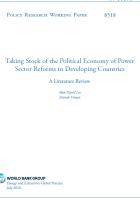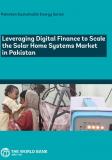Publications
The power sector reform experiences of developing countries vary greatly. To help explain this from a political economy perspective, this paper reviews several dozen statistical analyses, multi-country case studies, and development practice publications.
The frame of reference is the model of market-oriented reforms that became a global norm in the 1990s. Findings are organized in terms of the history, theory, motives, processes and outcomes of reforms. Market orientation emerged around the 1980s as part of a shift in economic theory and policy away from state control, and was expected to improve efficiency and investments. Reform advocates never took political economy issues into full consideration. Yet, policy makers have had sociopolitical as well as technical motives for reform, such as crisis response. International norms and competition for foreign investment and trade pulled governments to model reforms, while development partners pushed them as a condition of aid.
Reform implementation has been characterized by strong tensions among different public and private interests. Concretely, 1990s model reforms were based on a logic of depoliticizing pricing and investment decisions; often placing policy makers in a conflict of interest situation. Thus, the political costs and risks of reform have often exceeded the benefits perceived by local decision makers, especially as reforms did not generally result in immediate benefits for citizens. In practice, incremental, inclusive processes may be better than quick and stealthy reforms that sidestep stakeholders' concerns. While there was limited evidence of efficacy at the time the reforms were implemented, ex post the outcomes of reforms are ambiguous, as improvements in some areas have been offset by negative results elsewhere. For increasing access to electricity and clean energy, 1990s model reforms may help, but they are neither necessary nor sufficient, nor did they focus on these objectives.
In conclusion, the success or failure of policy prescriptions such as 1990s model reforms are contingent on dynamic, context-specific institutions as well as factors beyond the sector. More work is needed on integrated, flexible approaches to think and work politically in the sector, and to account for new technology and diverse sector development objectives.
Lee, Alan David; Usman, Zainab. 2018. Taking stock of the political economy of power sector reforms in developing countries : a literature review. Policy Research working paper; no. WPS 8518. Washington, D.C. : World Bank Group. http://documents.worldbank.org/curated/en/431981531320704737/Taking-stock-of-the-political-economy-of-power-sector-reforms-in-developing-countries-a-literature-review


